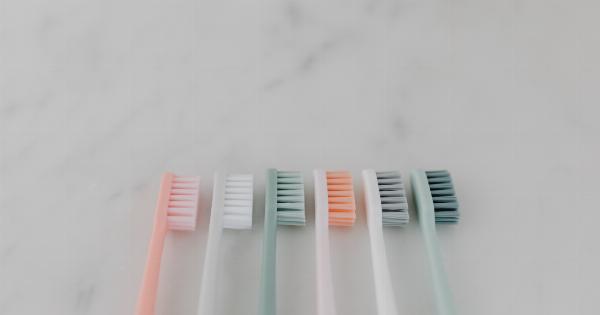Sharing toothbrushes with others is a common occurrence in many households. While it may seem harmless, it can lead to serious health risks.
In this article, we will explore the dangers of sharing toothbrushes and why it is important to use your own toothbrush.
Dangers of Sharing Toothbrushes
Sharing toothbrushes can lead to the transfer of bacteria and viruses between individuals.
This can happen because toothbrushes can become contaminated with bacteria and viruses from the mouth, which can then be transferred to another person’s mouth through the shared toothbrush.
One of the most common bacteria found in the mouth is Streptococcus mutans. This bacterium is responsible for tooth decay and can easily be transferred through sharing toothbrushes.
Other bacteria and viruses that can be transferred include herpes simplex virus, which can cause cold sores, and influenza virus.
The Importance of Using Your Own Toothbrush
Using your own toothbrush is important for maintaining good oral hygiene. When you share a toothbrush, you may not be able to clean your teeth properly because the bristles on the brush may be worn down or too soft.
This can lead to plaque buildup and gum disease.
Additionally, sharing a toothbrush can lead to cross-contamination of bacteria and viruses between individuals, which can compromise your immune system.
This is particularly important for people who have weakened immune systems, such as young children, the elderly, and those who are immunocompromised.
Alternatives to Sharing Toothbrushes
If you find yourself in a situation where you need to share a toothbrush, there are a few alternatives that you can consider:.
- Use your finger as a toothbrush
- Use a disposable toothbrush
- Use a travel toothbrush that can be sterilized
While these alternatives are not ideal, they are a safer option than sharing a toothbrush with another person.
Cleaning and Storing Your Toothbrush
It is important to clean and store your toothbrush properly to prevent the buildup of bacteria and viruses. After brushing your teeth, rinse your toothbrush thoroughly with water and allow it to air dry.
Do not store your toothbrush in a closed container or cover it with a cap, as this can lead to the growth of bacteria and mold on the bristles.
It is recommended that you replace your toothbrush every three to four months, or sooner if the bristles become frayed or damaged. This will ensure that you are using a clean and effective toothbrush that is not contaminated with bacteria or viruses.
Conclusion
Sharing toothbrushes may seem harmless, but it can lead to serious health risks. To maintain good oral hygiene and prevent the transfer of bacteria and viruses, it is important to use your own toothbrush and avoid sharing it with others.
If you find yourself in a situation where you need to share a toothbrush, consider using one of the alternative options mentioned above.






























